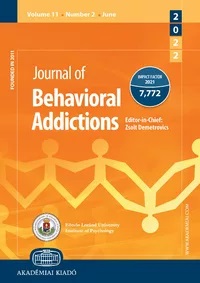Which conditions should be considered as disorders in the International Classification of Diseases (ICD-11) designation of “other specified disorders due to addictive behaviors”?
Which conditions should be considered as disorders in the International Classification of Diseases (ICD-11) designation of “other specified disorders due to addictive behaviors”?
Author(s): Matthias Brand, Hans-Jürgen Rumpf, Zsolt Demetrovics, Astrid Müller, Rudolf Stark, Daniel L. King, Anneke Goudriaan, Karl Mann, Patrick Trotzke, Naomi A. Fineberg, Samuel R. Chamberlain, Shane W. Kraus, Elisa Wegmann, Joël Billieux, Marc N. PotenzaSubject(s): Behaviorism
Published by: Akadémiai Kiadó
Keywords: Addictive behaviors; ICD-11; pornography-use disorder; buying-shopping disorder; problematic social-network use
Summary/Abstract: Background. Gambling and gaming disorders have been included as “disorders due to addictive behaviors” in the International Classification of Diseases (ICD-11). Other problematic behaviors may be considered as “other specified disorders due to addictive behaviors (6C5Y).” Methods. Narrative review, experts' opinions. Results. We suggest the following meta-level criteria for considering potential addictive behaviors as fulfilling the category of “other specified disorders due to addictive behaviors”: 1. Clinical relevance: Empirical evidence from multiple scientific studies demonstrates that the specific potential addictive behavior is clinically relevant and individuals experience negative consequences and functional impairments in daily life due to the problematic and potentially addictive behavior. 2. Theoretical embedding: Current theories and theoretical models belonging to the field of research on addictive behaviors describe and explain most appropriately the candidate phenomenon of a potential addictive behavior. 3. Empirical evidence: Data based on self-reports, clinical interviews, surveys, behavioral experiments, and, if available, biological investigations (neural, physiological, genetic) suggest that psychological (and neurobiological) mechanisms involved in other addictive behaviors are also valid for the candidate phenomenon. Varying degrees of support for problematic forms of pornography use, buying and shopping, and use of social networks are available. These conditions may fit the category of “other specified disorders due to addictive behaviors”. Conclusion. It is important not to over-pathologize everyday-life behavior while concurrently not trivializing conditions that are of clinical importance and that deserve public health considerations. The proposed meta-level-criteria may help guide both research efforts and clinical practice.
Journal: Journal of Behavioral Addictions
- Issue Year: 11/2022
- Issue No: 2
- Page Range: 150-159
- Page Count: 10
- Language: English

